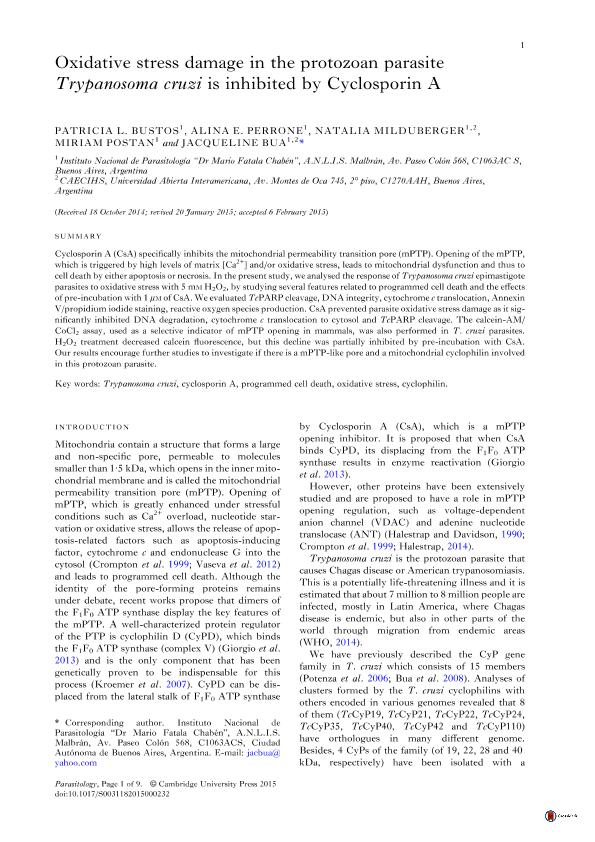Artículo
Oxidative stress damage in the protozoan parasite Trypanosoma cruzi is inhibited by Cyclosporin A
Bustos, Patricia Laura ; Perrone, Alina Elizabeth
; Perrone, Alina Elizabeth ; Milduberger, Natalia Ayelen; Postan, Miriam
; Milduberger, Natalia Ayelen; Postan, Miriam ; Bua, Jacqueline Elena
; Bua, Jacqueline Elena
 ; Perrone, Alina Elizabeth
; Perrone, Alina Elizabeth ; Milduberger, Natalia Ayelen; Postan, Miriam
; Milduberger, Natalia Ayelen; Postan, Miriam ; Bua, Jacqueline Elena
; Bua, Jacqueline Elena
Fecha de publicación:
07/2015
Editorial:
Cambridge University Press
Revista:
Parasitology
ISSN:
0031-1820
Idioma:
Inglés
Tipo de recurso:
Artículo publicado
Clasificación temática:
Resumen
Cyclosporin A (CsA) specifically inhibits the mitochondrial permeability transition pore (mPTP). Opening of the mPTP, which is triggered by high levels of matrix [Ca2+] and/or oxidative stress, leads to mitochondrial dysfunction and thus to cell death by either apoptosis or necrosis. In the present study, we analysed the response of Trypanosoma cruzi epimastigote parasites to oxidative stress with 5 mM H2O2, by studying several features related to programmed cell death and the effects of pre-incubation with 1 μM of CsA. We evaluated TcPARP cleavage, DNA integrity, cytochrome c translocation, Annexin V/propidium iodide staining, reactive oxygen species production. CsA prevented parasite oxidative stress damage as it significantly inhibited DNA degradation, cytochrome c translocation to cytosol and TcPARP cleavage. The calcein-AM/ CoCl2 assay, used as a selective indicator of mPTP opening in mammals, was also performed in T. cruzi parasites. H2O2 treatment decreased calcein fluorescence, but this decline was partially inhibited by pre-incubation with CsA. Our results encourage further studies to investigate if there is a mPTP-like pore and a mitochondrial cyclophilin involved in this protozoan parasite.
Archivos asociados
Licencia
Identificadores
Colecciones
Articulos(SEDE CENTRAL)
Articulos de SEDE CENTRAL
Articulos de SEDE CENTRAL
Citación
Bustos, Patricia Laura; Perrone, Alina Elizabeth; Milduberger, Natalia Ayelen; Postan, Miriam; Bua, Jacqueline Elena; Oxidative stress damage in the protozoan parasite Trypanosoma cruzi is inhibited by Cyclosporin A; Cambridge University Press; Parasitology; 142; 8; 7-2015; 1024-1032
Compartir
Altmétricas



